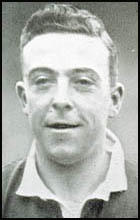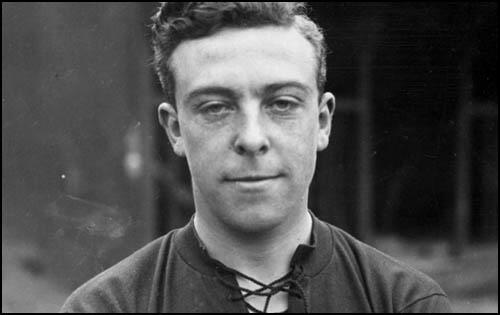Joe Hulme

Joseph (Joe) Hulme was born in Stafford on 26th August 1904. He played local football before joining York City in 1922. He scored 3 goals in 31 games for the Third Division side before moving to Blackburn Rovers in February 1924 for £250.
Hulme soon established himself in the First Division side and developed a reputation as being the fastest player in the Football League. In his first full season at the club, Blackburn finished in 16th place.
In February 1926 Herbert Chapman, the Arsenal manager, purchased Joe Hulme for £3,500. He joined a team that included as David Jack, Jimmy Brain, Jack Lambert, Bob John, Jack Butler, Andy Neil, Jimmy Ramsey, Billy Blyth, Cliff Bastin, Herbert Roberts, Alf Baker and Tom Parker.
Joe Hulme made his debut against Leeds United on 6th February 1926. He was an immediate success. As Jeff Harris has pointed out in his book, Arsenal Who's Who: "By the end of the first season Hulme's startling pace had become his trade mark, his main trick being to push the ball past the opposing full-back then tear past him as if he never existed."
In the 1925-26 season Arsenal finished in second-place to Huddersfield Town. Top scorer was Jimmy Brain who established a new club record with 33 goals. Brain's partner, Charlie Buchan, scored 21 goals that season. Many of these goals had been created by Joe Hulme.
Henry Norris refused to allow Herbert Chapman to spend much money to strengthen his team and in the 1926-27 season Arsenal finished in 11th position. However, they did enjoy a good run in the FA Cup. They beat Port Vale (0-1), Liverpool (2-0), Wolverhampton Wanderers (1-0) and Southampton (2-1) to reach the final at Wembley against Cardiff City. Arsenal lost the game 1-0.
Hulme won his first international cap for England against Scotland on 2nd April 1927. England won the game 2-1. Hulme retained his place in the team and that year played against Belgium (9-1), France (6-0), Northern Ireland (0-2) and Wales (1-2). Other members of the England team that year included Dixie Dean, Tom Cooper, Stanley Earle, Edward Hufton and Alf Baker.
In October 1927, Herbert Chapman signed Eddie Hapgood, a 19 year old milkman, who was playing for non-league Kettering Town for a fee of £750. This was followed by the purchase of David Jack (£10,000), Cliff Bastin (£2,000) and Alex James (£8,750).

In the 1929-30 season Arsenal finished in 14th place in the First Division. They did much better in the FA Cup. Arsenal beat Birmingham City (1-0), Middlesbrough (2-0), West Ham United (3-0) and Hull City (1-0) to reach the final against Chapman's old club, Huddersfield Town. Arsenal won the game 2-0 with goals from Alex James and Jack Lambert and Hulme had his first cup winners' medal.
The following season Arsenal won their first ever First Division Championship with a record 66 points. The Gunners only lost four games that season. Jack Lambert was top-scorer with 38 goals. Other important players in the team included Joe Hulme, Frank Moss, Alex James, David Jack, Cliff Bastin, Eddie Hapgood, Bob John, Jimmy Brain, Tom Parker, Herbert Roberts, Alf Baker and George Male.
Alex James was injured for a large part of the 1931-32 season and this was a major factor in Arsenal losing the title by two points to Everton. Arsenal won the First Division by four points in the 1932-33 season. Cliff Bastin was the club's top scorer with 33 goals. This was the highest total ever scored by a winger in a league season. Joe Hulme contributed 20 goals. This included two hat-tricks against Sunderland and Middlesbrough.
This illustrates the effectiveness of Chapman's counter-attacking strategy. As the authors of The Official Illustrated History of Arsenal have pointed out: "In 1932-33 Bastin and Hulme scored 53 goals between them, perfect evidence that Arsenal did play the game very differently from their contemporaries, who tended to continue to rely on the wingers making goals for the centre-forward, rather than scoring themselves. By playing the wingers this way, Chapman was able to have one more man in midfield, and thus control the supply of the ball, primarily through Alex James."
Sunderland was the main challengers to Arsenal in the 1933-34 season thanks to a forward line that included Raich Carter, Patsy Gallacher, Bob Gurney and Jimmy Connor. In March 1934 Sunderland went a point ahead. However, the Gunners had games in hand and they clinched the league title with a 2-0 victory over Everton.
The following season Arsenal only finished in 6th place behind Sunderland. Arsenal did much better in the FA Cup that season. Arsenal beat Liverpool (2-0), Newcastle United (3-0), Barnsley (4-1) and Grimsby Town (1-0) to reach the final against Sheffield United. Ted Drake, who was not fully fit, scored the only goal of the final.
Some of Arsenal's key players such as Cliff Bastin, Alex James, Bob John and Herbert Roberts were past their best. Joe Hulme, Ted Drake and Ray Bowden continued to suffer from injuries, whereas Frank Moss was forced to retire from the game. Given these problems Arsenal did well to finish in 3rd place in the 1936-37 season.
In January 1938 Hulme was transferred to Huddersfield Town. During his time at Arsenal Hulme had scored 107 goals in 333 games. His last senior appearance was in the 1938 FA Cup Final against Preston North End. He therefore became the first player ever to appear in five Wembley cup finals.
During the Second World War Hulme was a reserve policeman. In February 1944 Hulme became assistant manager of Tottenham Hotspur. He became manager in October 1945. However, he did not have any success and he resigned from the post in May 1949. He then became a well-known journalist.
Joe Hulme died on 27th September, 1991.

